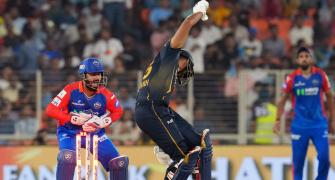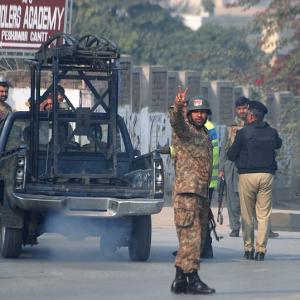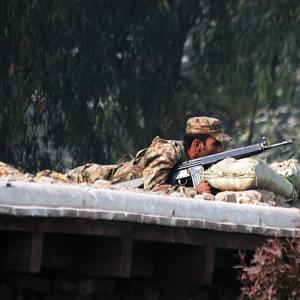
India must watch for signs after Peshawar that Pakistan is waking up to the dangers of Islamism, muses Ajai Shukla
After the sickening murder of over 130 schoolchildren in Peshawar last Tuesday by Tehrik-e-Taliban Pakistan terrorists, India has skeptically noted Pakistani declarations that terrorism must be fought without discriminating between ‘good terrorists’ and ‘bad terrorists’.
The crucial question is: will Pakistani anger be visited only on the TTP? Or on all groups in the lawless Federally Administered Tribal Area along the Afghanistan border, including the Afghan Taliban and the Haqqani Network, which the Pakistani military’s Inter-Services Intelligence has long supported?
Or will the crackdown eventually encompass Punjab-based jihadis like the Lashkar-e-Tayiba that are ‘strategic assets’ of the Pakistan army, meant to bleed India. In other words, will only ‘anti-Pakistan’ groups be in the cross hairs, or will ‘anti-India’ groups be targeted too?
Few Indians believe that Pakistan is about to shut down its long-running sub-conventional war against India.

Even so, it would be strategically unwise to entirely rule out that the Pakistan army might gradually realise what the world already sees: that growing operational, intelligence and ideological linkages between radical Islamist groups make it impossible for Pakistan to defeat terrorism in the FATA without simultaneously addressing it in Punjab.
Without doubt, the sceptics have powerful arguments, which are centred on the sub-continental colloquialism: a dog’s tail can never be straightened.
Yet, while Indian TV anchors and analysts gracelessly repeated Hillary Clinton’s 2011 adage -- ‘you can’t keep snakes in your backyard and expect them only to bite your neighbours’ -- Prime Minister Narendra Modi’s compassionate statement of solidarity to Pakistan left the door open for cooperation, should the Pakistani establishment choose to correct course.
So far, the naysayers are being proven right. The Pakistani military has targeted only anti-Pakistan militants in Khyber-Pakhtunkhwa and FATA.
Visiting front line units in Khyber on Friday, Pakistan’s army chief, General Raheel Sharif, exhorted them to finish off ‘the rebels’, clearly distinguishing between the rebel TTP and the obedient, pro-Pakistan LeT.
Sharif also read from a well-worn playbook by dashing off to Kabul the day after the Peshawar killings to urge Afghan President Ashraf Ghani to act jointly against militants ‘operating from Afghanistan’.
This perpetuated the Pakistani narrative that foreign countries are responsible for all militancy in Pakistan. Singing chorus was LeT chief, Hafiz Saeed, who told baying crowds that India was masterminding and bankrolling the TTP and was behind the Peshawar killings.
On Sunday, Imran Khan’s jihad-friendly party, the Pakistan Tehrik-e-Insaf, spoke out against the jihadis, condemning ‘the banned Tehreek-i-Taliban Pakistan and all other terror groups that have unleashed their brutality on the people of Pakistan’. The subtext: “Why don’t you stick to unleashing brutality on the people of India? We don’t have a problem with that.”
If this needed unambiguous, official endorsement, Prime Minister Nawaz Sharif’s closest foreign policy advisor, Sartaj Aziz, provided that in an interview with the BBC last month, in which he said Pakistan would not target militant groups that “did not pose a threat to the state”.
Islamabad claims he was quoted out of context; most of the world believes Aziz was being unusually truthful.
What of Pakistan’s actions since the Peshawar horror? Press reports suggest that retaliatory air strikes have killed over 120 militants in FATA. Since air strikes are blunt weapons, only a few were probably militants, while the rest were collateral damage -- relatives, even children, and little fish who were with the wrong person, in the wrong place, at the wrong time.
Islamabad has resumed executing 'terrorists' on death row, with six having already been hanged and some 55 in the queue. It has emerged, however, that several of those are violent criminals, not terrorists.
Pakistani commentator Pervez Hoodbhoy argues that the killing of 132 children will hardly shake Pakistan’s conscience.
He notes: “Nothing changed after Lakki Marwat when 105 spectators of a volleyball match were killed by a suicide bomber in a pickup truck. Or, when 96 Hazaras in a snooker club died in a double suicide attack.”
“The 127 dead in the All Saints Church bombing in Peshawar, or the 90 Ahmadis killed while in prayer, are now dry statistics. In 2012, men in military uniforms stopped four buses bound from Rawalpindi to Gilgit, demanding that all 117 persons alight and show their national identification cards. Those with typical Shia names, like Abbas and Jafri, were separated. Minutes later corpses lay on the ground.”
Indian scepticism is also stoked by numerous broken pledges of action. General Pervez Musharraf promised action after India mobilised its military in response to the December 2001 Parliament attack.
In a widely reported speech on August 14, 2012, General Ashfaq Kayani announced, “the war against extremism and terrorism is not only the army’s war, but that of the whole nation”. Nothing came of that either.”

What will it take to force a crack down on Punjab-based radical groups like the LeT? Pakistani columnist, Cyril Almeida, recounts that previous army chief General Ashfaq Kayani was asked in a closed-door meeting with security experts why Punjab-based terror groups were being spared, even though the Pakistan army knew that the fight in FATA could not be won without targeting them.
Kayani’s response: that would fracture the Pakistan army and he would not allow that on his watch.
Even so, New Delhi must be alert for signs of change in Pakistan; the associated political difficulty would force change to be slow and stealthy. Note should be taken of the immediate re-arrest of LeT operations chief and alleged 26/11 mastermind, Zaki-ur-Rehman Lakhvi, after a court granted him bail.

Islamabad’s attitude towards Hafiz Saeed must be similarly monitored. Earlier this month, two special trains from Karachi and Hyderabad conveyed his followers to a two-day congregation in Lahore. Any visible reduction of this government patronage would be a sure sign of change.
On Sunday, an ‘anti-terrorism working group’, constituted after the Peshawar attack, has finalised recommendations to strengthen Islamabad’s counter-terror mechanisms. These will now be reviewed by an All-Party Conference and the National Security Council, and might indicate changing attitudes.
Can Pakistan’s tiny (but courageous) civil society induce the government to act? Last week they staged a vocal protest outside Islamabad’s infamous Lal Masjid, branding its chief cleric, Maulana Abdul Aziz, a ‘Taliban apologist’ for refusing to condemn the Peshawar attack.
It would be recalled that the heroic preacher had dressed as a woman to flee the Pakistan army’s assault on the Lal Masjid in 2007 -- a tactic emulated in 2011 by Baba Ramdev to escape a police crackdown in New Delhi. This time, the Islamabad police quickly broke up the protest. Reform: 0; Status quo: 1.



.jpg)







